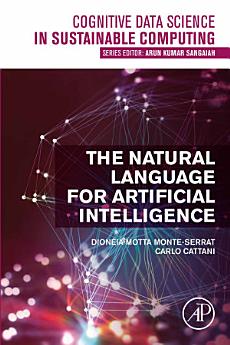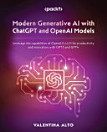The Natural Language for Artificial Intelligence
Mar 2021 · Academic Press
Ebook
252
Pages
family_home
Eligible
info
reportRatings and reviews aren’t verified Learn More
About this ebook
The Natural Language for Artificial Intelligence presents the biological and logical structure typical of human language in its dynamic mediating process between reality and the human mind. The book explains linguistic functioning in the dynamic process of human cognition when forming meaning. After that, an approach to artificial intelligence (AI) is outlined, which works with a more restricted concept of natural language that leads to flaws and ambiguities. Subsequently, the characteristics of natural language and patterns of how it behaves in different branches of science are revealed to indicate ways to improve the development of AI in specific fields of science. A brief description of the universal structure of language is also presented as an algorithmic model to be followed in the development of AI. Since AI aims to imitate the process of the human mind, the book shows how the cross-fertilization between natural language and AI should be done using the logical-axiomatic structure of natural language adjusted to the logical-mathematical processes of the machine. - Presents a comprehensive approach to natural language and its inherent and complex dynamics - Develops language content as the next frontier, identifying the universal structure of language as a common structure that appears in both AI and cognitive computing - Explains the standard structure present in cognition and AI, making them interchangeable - Offers examples of the application of the universal language model in image analysis and conventional language
About the author
Dionéia Motta Monte-Serrat is a Post-doctoral Researcher at the Department of Computation and Mathematics of Faculty of Philosophy, Sciences and Letters of Ribeirao Preto – University of Sao Paulo, FFCLRP-USP, Brazil; Collaborating researcher at Language Institute of University of Campinas, IEL-UNICAMP, Brazil. Faculty Member at University of Ribeirao Preto, UNAERP, Brazil. Direct Doctoral degree in Psychology, FFCLRP-USP, Brazil. Doctoral degree program partly completed at Université Paris III, Sorbonne Nouvelle (2010, CAPES-BEX). Internship at École des Hautes Études en Sciences Sociales, Paris (2012, FAPESP). Undergraduate degrees in Languages and Law. Member of the British Wittgenstein Society. Associate Researcher, National Science Network for Education (Rede CpE, Brazil). Research interest: Neuroscience; Neurolinguistics; Neurocognition; Brain Impairment; Artificial Intelligence; Neurophysiology; Natural Language, Education, Social inclusion.Dr. Carlo Cattani is Full Professor of Mathematical Physics and Applied Mathematics at the Department of Economics, Engineering, Society and Enterprise (DEIM) at Università degli Studi della Tuscia, Viterbo, Italy. He has been previously appointed as Professor and Research Fellow at the Department of Mathematics, University of Rome La Sapienza, and Department of Mathematics, University of Salerno. Dr. Cattani has been a Research Fellow at the Italian Council of Research (CNR) and Visiting Research Fellow at the Physics Institute of Stockholm University. His main scientific research interests are focused on numerical and computational methods, mathematical models and methods, time series and data analysis, computer methods and simulations. Dr. Cattani is co-author of several books, including The Natural Language for Artificial Intelligence, Elsevier Academic Press; Wavelet and Wave Analysis as Applied to Materials with Micro or Nanostructure, World Scientific Publishing; Fractional Dynamics, De Gruyter; Computational Methods for Data Analysis, De Gruyter; Fractal Analysis: Basic Concepts and Applications, World Scientific Publishing; Symmetry and Complexity, Mdpi AG; and Advances in Mathematical Modelling: Applied Analysis and Computation, Springer. He has made significant contributions to scientific and mathematical research on fundamental topics such as numerical methods, dynamical systems, fractional calculus, fractals, wavelets, nonlinear waves, and data analysis. Dr. Cattani is Editor in Chief of the journals Fractal and Fractional and Information Sciences Letters.
Rate this ebook
Tell us what you think.
Reading information
Smartphones and tablets
Install the Google Play Books app for Android and iPad/iPhone. It syncs automatically with your account and allows you to read online or offline wherever you are.
Laptops and computers
You can listen to audiobooks purchased on Google Play using your computer's web browser.
eReaders and other devices
To read on e-ink devices like Kobo eReaders, you'll need to download a file and transfer it to your device. Follow the detailed Help Center instructions to transfer the files to supported eReaders.








